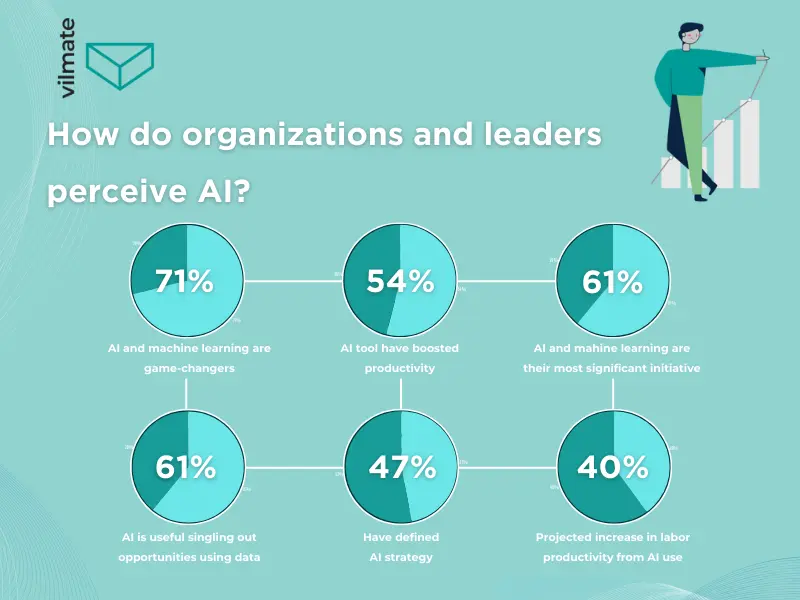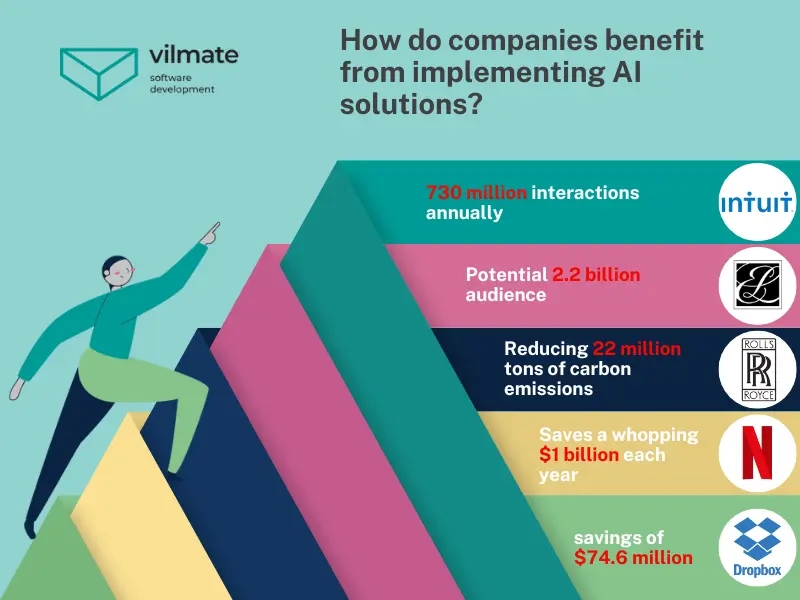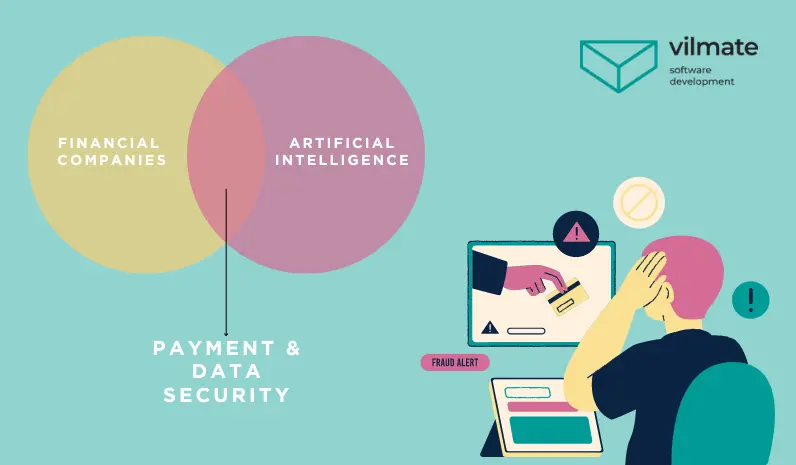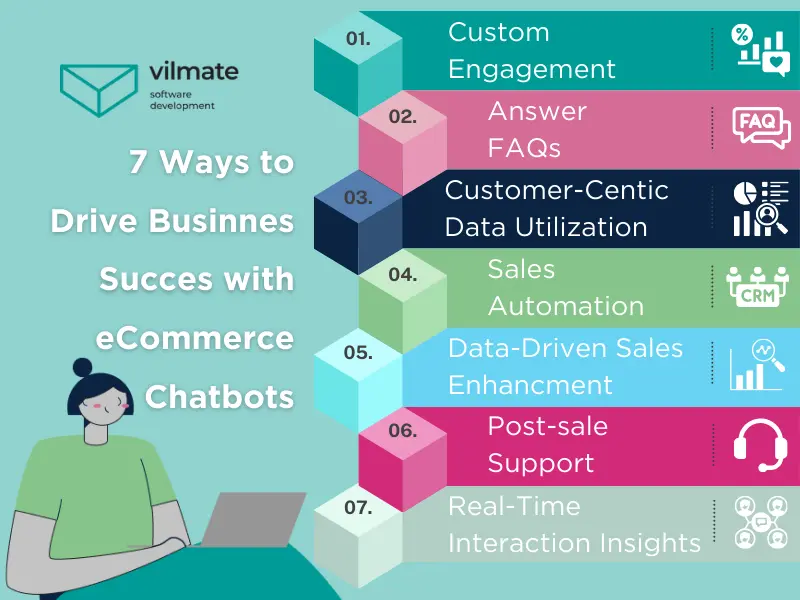E-commerce stands out as one of the major areas where AI is applied. We’ve already discussed the process of developing an AI chatbot and briefly highlighted its advantages in the previous article about creating your AI assistant.
Now, let's look at how businesses use artificial intelligence. We'll explore how famous companies are already using AI to improve their operations. The article will also share more about the practical use of AI chatbots, a simple and helpful tool for businesses.
How Is Artificial Intelligence Transforming the Business Landscape?
Let's start by looking at some statistics to gauge the impact of AI on businesses.
Forbes consultants recently shared survey results, revealing that 97% of business owners believe ChatGPT can benefit their businesses.
This remarkable statistic demonstrates one clear trend: artificial intelligence is becoming widespread in business, with many companies already incorporating it into their operations.
According to Forbes Advisor, over 60% of business owners are confident that AI can enhance their relationships with customers and increase overall productivity. Look at the statistics presented below to gain insights into how leaders in organizations perceive the role of artificial intelligence.

But what are the insights from companies that have already embraced AI? 54% of respondents affirm that AI has proven to be a financially beneficial investment, and an equal percentage of executives acknowledge that the technology significantly streamlines decision-making.
A primary driver for incorporating artificial intelligence into businesses is the scarcity of human resources. For instance, 25% of companies find themselves compelled to adopt AI due to a shortage of qualified personnel in the labor market.
However, statistics are just numbers. We must practically explore how artificial intelligence aids companies in growth, resource conservation, and customer satisfaction. So, let's take a behind-the-scenes look at how well-known companies implement AI.
Practical Applications of Artificial Intelligence: 10 Companies Embracing AI
You're likely aware that Google is actively developing and widely applying Artificial Intelligence. You might have heard about Samsung launching the world's first AI phone, making this technology easily accessible to a broad audience.
Today, let's delve into less obvious examples of how companies use AI and explore the economic savings and unique benefits they gain from incorporating this technology.
1. Dropbox.
Once an ambitious startup, Dropbox initially introduced itself through a simple video explaining its purpose. Today, it has become one of the most well-known file-hosting services. The company has established its infrastructure, making it less dependent on Amazon's web services.
To enhance cost efficiency in cloud services and operational expenses, Dropbox has incorporated Artificial Intelligence. This strategic move is anticipated to result in savings of $74.6 million over two years.
2. Estée Lauder.
Estée Lauder is an excellent example of a company leveraging AI to make their products more accessible. The skincare giant has introduced an AI helper, the Voice-enabled Makeup Assistant (VMA), specifically designed to assist people with visual impairments in using Estée Lauder products.
This voice assistant guides those with visual challenges through applying makeup and skincare items, allowing them to go through their beauty routines independently. Thanks to Artificial Intelligence, Estée Lauder has crafted an ideal assistant to offer personalized recommendations for various skin tones and face types. The AI system effortlessly analyzes customer videos, evaluating the uniformity of makeup applications to provide tailored tips.
While the financial impact of AI on Estée Lauder is uncertain, the significance lies in the potential reach. With over 2 million visually impaired individuals in the UK and a staggering 2.2 billion globally, Estée Lauder can expect a considerable broadening of its audience through this inclusive approach.
3. Rolls-Royce.
Rolls-Royce is often linked to cars, but nowadays, its main focus is making aviation and marine engines. The company is embracing new technologies, like machine learning and digital twins.
Rolls-Royce can reduce carbon emissions and streamline technical maintenance thanks to these advancements. This results in more dependable Rolls-Royce engines, allowing planes to stay in the air longer. Rolls-Royce uses the Intelligent Engine platform to analyze engine performance metrics and operating conditions.
Consequently, the company has stretched the time between engine maintenance by 50%, saving on spare parts. Moreover, Rolls-Royce has enhanced engine efficiency through AI, reducing 22 million tons of carbon emissions.
4. Netflix.
It's widely known that Netflix uses AI to personalize the content it recommends to users. The platform suggests new movies and shows based on your interests. What might be surprising is that Netflix saves a whopping $1 billion each year by employing this artificial intelligence approach.
Here's how it works: research indicates that the average Netflix user loses interest within 60-90 seconds of browsing through 10-20 titles. During this brief time, Netflix needs to present the user with content they find interesting; otherwise, there's a higher chance that the user might stop using the service. Particularly noteworthy is that around 80% of users pick content from recommendations rather than directly searching for it.
Artificial intelligence plays a crucial role in this process, helping Netflix find an engaging show within 90 seconds based on user preferences. This fact explains why so many people choose Netflix, ultimately allowing the company to rake in billions through its content.
 лаополао
лаополао
5. Nordstrom.
The retail giant Nordstrom sets itself apart by incorporating over 100 AI models. They've introduced the Nordstrom Analytical Platform (NAP), which provides a deep understanding of customer behavior, enhancing the overall shopping experience.
Thanks to AI, Nordstrom can precisely manage its inventory and ensure accurate order tracking for customers. According to the company's CEO, the primary aim of the Nordstrom platform is to personalize the digital experience and offer products at an individual level.
6. Johnson & Johnson.
When discussing artificial intelligence, we often emphasize its great potential in healthcare. Johnson & Johnson is already implementing AI, providing a tangible example of its benefits.
For instance, Neutrogena, one of the company's brands, uses AI in an app that analyzes changes in a user's face to assess the effects of skincare products. This app enables the company to demonstrate the effectiveness of its procedures to customers, leading to increased cosmetics sales.
Furthermore, Johnson & Johnson utilizes artificial intelligence in developing new medications. AI examines and categorizes images of microscopic compounds, organizing information for future experiments related to various diseases.
7. Intuit.
Intuit is a company that creates accounting software. They recently introduced their own AI-based platform, Generative AI Operating System (GenOS). This platform focuses on solving taxes, accounting, marketing, cash flow, and personal finance issues. With GenOS, Intuit's tech experts can quickly develop and implement revolutionary features of Generative Artificial Intelligence (GenAI).
By driving rapid innovations in its products and services, the company aims to address the significant financial challenges faced by its customers and ensure sustainable growth. Intuit's AI processes an impressive 730 million interactions annually, leading to 58 billion daily training forecasts. Of course, as more people use Intuit's products, the company's revenue naturally increases.
8. Boeing.
Boeing uses artificial intelligence to identify and address issues in aircraft operations, ultimately improving flight safety. They've also partnered with Shield AI to collaborate on autopilot technology. Thanks to this partnership, Boeing has developed a virtual pilot with expertise in managing multiple aircraft, allowing their drones and fighters to operate autonomously.
The integration of artificial intelligence contributes to Boeing's efforts to improve safety and helps safeguard the most precious thing in the world – human lives.
9. Amazon.
Amazon employs Artificial Intelligence (AI) across various aspects of its operations, and it's no surprise given the company's involvement in e-commerce, logistics, cloud computing, voice-activated technology, and more.
A clear example of AI usage is analyzing images and videos to offer personalized product recommendations to consumers. Amazon also utilizes AI to predict demand, improve its supply chain efficiency, and optimize inventory levels.
This approach helps Amazon deliver excellent service, enhancing consumer engagement and overall revenue. Notably, Amazon patented its first AI for predictive logistics in 2014, establishing the company as a pioneer in this field.
10. Visa.
Visa harnesses the power of artificial intelligence to analyze customer behavior data spanning several decades. This analysis helps identify unusual account activity and swiftly detects fraudulent transactions within milliseconds. While these systems may occasionally produce false alarms, blocking legitimate customer payments, they have significantly reduced instances of fraud.

MasterCard and PayPal also adopt a similar approach, leveraging artificial intelligence to decrease the risks associated with customer payment data breaches substantially. As a result, payment systems have established themselves as reliable service providers, earning a reputation for security and avoiding numerous legal challenges.
Now, you can see how diverse companies use artificial intelligence and the benefits they gain. If you also want to implement artificial intelligence in your business, introducing an AI chatbot is the easiest way to start. We've covered the advantages of this technology in the first part of our article. Let's delve into how companies are already using these chatbots.
How AI Chatbots Make a Difference for Companies
IBM, a leading company in the field of artificial intelligence, has introduced the IBM Watson Assistant™ platform, designed for conversational AI. This tool makes it effortless for businesses to incorporate AI capabilities, and many companies have already embraced this technology through IBM.
One standout success story is Camping World, a global retailer of recreational vehicles, which opted for IBM Watson Assistant™ services. Facing a surge in customer demand after the COVID-19 pandemic, Camping World's call center experienced challenges with long wait times and customers struggling to connect with operators.
Moreover, during off-hours, the company missed out on thousands of calls, potentially losing customers. To address this, the Camping World team introduced a new member – Arvee, a chatbot created using the Watson Assistant platform. Arvee can operate 24/7. The team assigned routine tasks to the artificial intelligence, allowing human agents to focus on handling more complex customer questions.
Arvee also began collecting data on customer interactions and monitoring customer activity during the company's non-business hours. Implementing artificial intelligence resulted in a 40% increase in customer engagement and a 33% improvement in overall efficiency for Camping World.
Here's another example of a successful chatbot implementation, this time by General Motors. The company faced a challenge in managing job candidates due to a high volume of resumes – up to two million per year. The hiring process, taking up to five days for a single interview, needed streamlining.
The CEO's goal was clear:
- Reduce interview time.
- Simplify the recruiter's tasks.
- Automate the hiring process to bring in highly qualified personnel swiftly.
That’s why General Motors have developed an AI chatbot called Ev-e. It handles interview scheduling and addresses candidate queries 24/7.
In just a year, General Motors reaped the benefits: they saved $2 million in recruiter salaries and successfully scheduled and conducted over 500,000 candidate interviews. The result was a staggering 99% slashed interview scheduling time. While recognizing room for improvement, it's evident that the chatbot development brought significant advantages to the company.
Look at another example – the NikeShoeBot, which was explicitly created for Nike. This AI assistant helps customers find the perfect pair of shoes based on their preferences. What's more, NikeShoeBot allows users to design their shoes. Although the development may seem simple and standard, Nike experienced a significant boost. Their average click-through rate increased by 12.5 times, and website conversion rates quadrupled.
Artificial intelligence brought in profits for the company and highlighted Nike's commitment to innovation and a modern brand image.
Now, how can you make use of an AI chatbot for your business? Check out the table below for some practical ideas.

Conclusion
In conclusion, artificial intelligence is undeniably shaping our future. Incorporating AI into your business today signals your embrace of innovation and marks a crucial step toward complete digital transformation. With people increasingly intrigued by this new technology, now is the perfect time to leverage AI to attract new customers.
Feel free to contact Vilmate if you aim to surpass competitors, unlocking fresh opportunities for efficiency and cost savings. Our team of developers is dedicated to crafting and implementing the ideal solution that will elevate your business to new heights.





